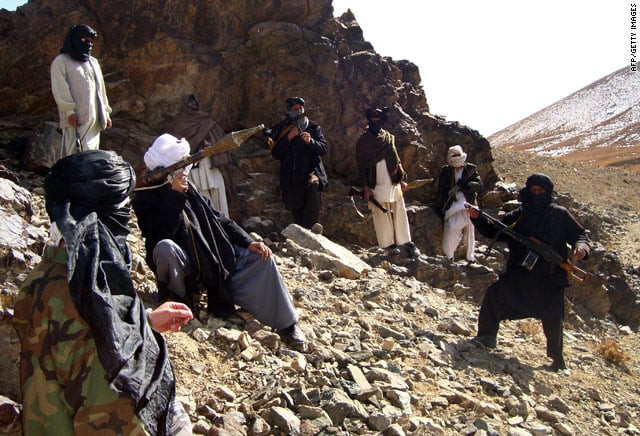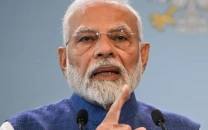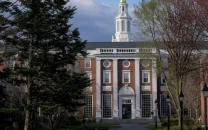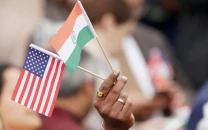Taliban not real US enemy: former hostage
Jere Van Dyk drew a surprising conclusion: the die-hard Taliban insurgency might not be the real enemy.

The US author's newly published memoir "Captive: my time as a prisoner of the Taliban" makes clear that nothing is black-and-white in Afghanistan -- neither his own terrifying ordeal in 2008, nor the US-led war as a whole.
"Captive" brims with the fear and confusion Van Dyk experienced as he and three Afghan cellmates prayed for salvation from what they thought was to be their certain shooting or beheading. But in an interview with AFP in New York, Van Dyk said the Taliban, unlike al Qaeda, doesn't choose to be at war with the United States. "They're not the enemy here (on US soil). They're our enemy because we're there," Van Dyk said in his apartment decorated with arrows, an Afghan saddlebag and other souvenirs of an adventurous career.
The Taliban, he said, are "isolated" and "hardened" by years of war, but still fundamentally remain a local movement, separate to al Qaeda's global jihad. "People think they're the same, but I believe they're distinctly different." Few outsiders understand Afghanistan's complexities better than Van Dyk, 64. He has visited the country and worked there as a journalist on and off since the 1970s. In February 2008, he was captured at gunpoint while attempting to report in the Taliban heartland on the Afghan-Pakistani border. He still doesn't know who seized him, where he was kept and how his release was secured six weeks later.
Chillingly, he can't rule out that some of the Afghans he trusted and befriended in arranging his trip to the dangerous region were the ones who betrayed him. "To this day, I don't know and I'm haunted by it," he said. That murkiness, warned Van Dyk, is a microcosm of what the United States and Nato face as they juggle fighting al Qaeda and the Taliban, propping up President Hamid Karzai and managing a complex relationship with Pakistan.
In the land that Washington insiders dub AfPak, nothing is as it seems, Van Dyk said. So while Pakistan is officially a close US ally, the Taliban's black-turbaned fighters roam freely across the border with Afghanistan. "I had a very clear impression that in a complex way, the (Pakistani intelligence service) ISI is backing Taliban leaders, Taliban groups," he said.
And the most wanted man in the world, al Qaeda chief Osama bin Laden, might enjoy an even safer haven. Having seen first hand how carefully his captors hid him for just 45 days, Van Dyk said it's impossible someone with bin Laden's profile could remain undercover, among ordinary people, for a decade.
"He's too big to hide. Physically they could, but he's too big politically," he said. "I came away with the impression the ISI is hiding him in some military base somewhere. Or maybe he's in Saudi Arabia."
These complexities, particularly the opaque policies of Pakistan, are what lie behind the daily headlines about roadside bombs and American deployments, according to Van Dyk. So instead of seeking military victory in remote Afghan villages, he said Washington should look deeper at the forces, including Pakistan, stirring the conflict from the outside.
"Those who are using this for geopolitical goals have to be brought to heel. They have to stop it," Van Dyk said. He also encouraged engaging the Taliban with more than just bullets and bombs. "We have to respect them," Van Dyk said. "It would take a great deal. I don't know if our culture is ready for that."
Van Dyk visited Afghanistan in the 1970s, when foreigners were welcome and women were free to seek education and choose their own clothing. In Kabul's streets, "you heard the call to Muslim prayer mixing with the Rolling Stones in the evening," he said. Now, he also knows the country's dark side. Back home in New York, he still receives threatening, anonymous phone messages, such as "we're watching you" and "it's your neck."
The experience taught Van Dyk a humility he said all Westerners should share before blundering into a culture they don't understand. "I felt I knew what I was doing, but it's clear I became a bit of an American, a Westerner and as a result I got hit," he said. "I didn't look around carefully around me at what was happening." Even today, Van Dyk admits he doesn't fully comprehend the circumstances of his kidnapping -- or the secrets of what's become America's longest war.
"There's a natural tendency: you want to find out what happened, to find out the truth," he said. Quietly, almost to himself, Van Dyk asked: "What is the truth?"



















COMMENTS
Comments are moderated and generally will be posted if they are on-topic and not abusive.
For more information, please see our Comments FAQ